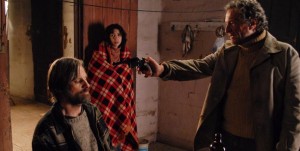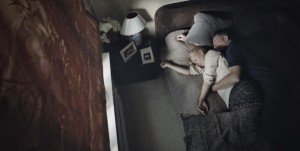Immediately prior to the showing of any film at TIFF there is a notification that comes up on the screen warning viewers that the illegal recording or any other form of reproduction of the movie they are about to see is subject to criminal prosecution. And at that precise moment, someone in the audience inevitably always yells “Arrrwff”. I am not making this up. Of course all festival attendees are staunch supporters of anti-piracy measures, and hence the guttural canine utterance is not a sign of protest. Rather it is just a vestigial TIFF legend passed on from year to year since who knows how long. The sound of the “Arrrwff” always brings me comfort because it reminds me that I am doing one my favorite things in the world: about to start watching a new film at TIFF.
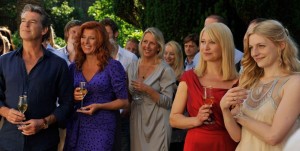
Not all movies need to be high art. Sometimes putting a film together is like organizing an event. If your guests leave having had a good time and having eaten well, and if they speak fondly afterward about it, then it has been a job well done. This is the case with Love is All You Need , the latest film from Susanne Bier (After The Wedding, In A Better World) which stars Pierce Brosnan, Trine Dyerholm and Paprika Steen. The plot involves extended families getting together for a wedding. Pierce Brosnan plays the groom’s father who has immersed himself completely into work since his wife’s death. Trine Dyerholm plays the bride’s mother, who has recently come off chemotherapy treatment. The wedding, scheduled in an old villa in Italy that is owned by Brosnan’s character, brings members of the two families together. And the plot writes itself. This is a full-bodied, well-constructed film that respects its characters; the kind of mainstream film that is increasingly rare these days. Yes a person can be cynical and find this movie rote and unoriginal and complain that they have seen it all before. And yes the movie is predictable from the turn of the first reel. But that does not take away from it being a thoroughly enjoyable ride all the same. I bought into this movie from the start, found it genuine, and believed in these characters. And I was within the movie through its running time instead of watching it from the outside. I suspect many will find it a piffle, a distraction, but this is the kind of film that resonates with me. Its a highlight of my TIFF experience. [By the way, I wish the original Danish title of the film, The Bald Hair-Dresser, had been retained as the English title too].
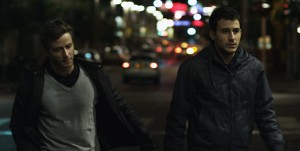
If one purpose of film (or any art form, for that matter) is to depict our greater contemporary conflicts, the movie Out In the Dark provides a striking example of what separates us now as human beings. Director Michael Mayer sets his story at the crossfire of one of the more unresolvable political impasses of our time, the Israeli-Palastinian conflict. What are the repercussions of the bonding between two people, one from Israel, and the other from Palestine? The filmmakers add an additional dimension to this conflict by layering it with something else that has the contemporary world currently divided: same-sex relationships. What if the bond in question was between two men who deeply love each other, but are from opposing sides of the geopolitical border? Nimr (Nicholas Jacob) is a Palestinian student who is granted a permit to travel daily to a Tel Aviv college in order to study with a noted professor. Roy (Michael Aloni) is a successful lawyer living a comfortable, affluent life in Israel. Both are surprised at the strength of their affinity for each other when they meet. Against their judgment, and knowledge of the imminent danger, both fall in love. As unplanned but all consuming as their bond is, how are the two to find a tenable logistical solution for them to co-exist. So repellant does Nimr’s Islamic family find the concept of homosexuality that they lack the ability to understand his dilemma. And Roy is having to contend with the Israeli Secret Service nipping at his heels with the knowledge of his association with a Palestinian man. Although the film occasionally gets heavy-handed with its approach, and weaves its narrative thread across too many secondary characters, I liked the matter-of-fact, unfussy handling of this material. And the urgency and barely restrained anger simmering under the telling of this story. Ultimately I admired most how the movie telescopes the current Middle-Eastern situation through the lens of these two individuals.
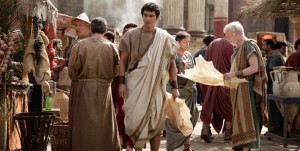
The film, Thermae Romae was the most profitable film of the year in Japan, the TIFF program informs us. And I can see why; it is a goofy, big-budget, time-travel adventure that is single-minded in its aim to entertain the audience. And indeed it was a crowd pleaser at the TIFF screening I attended. The movie plays with particularly broad humor, done with so much greater zest and wit in Mel Brooks’ History Of The World, Part I. The movie, based on a rabidly popular comic book of the same name, tells the story of an architect in ancient Rome with a special acumen for building bathhouses intended to comfort the Roman emperor and army generals. Having lost enthusiasm with his job, he one day slips underwater and gets sucked, literally, through the space-time continuum to arrive in modern day Japan. Marveling at the inventions of contemporary Japan, he brings the modern inventions back to ancient Rome to achieve much acclaim. Much of the film’s humor is derived from the fish out of water situation each time the protagonist travels to the modern day Japan. The audience I was watching this film with enjoyed the film a lot more than I did. Maybe it was because I kept trying to see past the moment by moment gags in the film. And after a while the back and forth travel in time got tiresome. The lead actor, Hiroshi Abe, so nuanced and finely tuned in Still Walking, is asked here to play the character so broadly that he is left with doing not much more than providing exaggerated reaction shots of surprise. This is the kind of film that may go best combined with a beer on a Friday or Saturday night.


